Professor and MEP Zdzisław Krasnodębski commented on the ongoing conflict between Poland and the European Union in an interview for portal wPolityce.pl, with Krasnodębski ironically agreeing with German newspaper Der Tagesspiegel’s notion that the easiest way to resolve the conflict would be Law and Justice’s (PiS) defeat in the elections and the rise to power of pro-European forces.
The Polish professor says that this solution would be the least costly one politically and economically from the point of view of the European Commission and European Parliament.
Howevere, professor Krasnodębski warned that the process of the EU’s federalization would accelerate if the government in Poland changed hands.
“Poland has become the leader and symbol of resistance against creeping federalization. The breaking of Polish resistance would terrify weaker states,” he stressed.
He pointed to the example of Greece which broke under EU pressure when its left-wing government attempted to pursue a policy incompatible with EU policy. Another example was the shift of government in Italy due to EU pressure. Such changes in Poland would have much more radical consequences.
Prof. Zdzisław Krasnodębski:
Poland has become the leader and symbol of resistance against creeping federalization. The breaking of Polish resistance would terrify weaker states.
Krasnodębski warned that if Poland was broken, the supremacy of EU law would be accepted in any region considered peripheral in the union. It would also be a clear message that only “pro-European” governments would be permitted in those countries. A further step could be the direct management of such member states via commissioners.
The professor also explained that the result of the ongoing conflict between Poland and the EU wasn’t as important as the methods which the EU would utilize concerning decisions made in Poland that were not approved by EU elites.
“In this moment, the method is simple — a lawsuit against Poland is flied to the European Court of Justice and a single judge decides, not even through a verdict, but by imposing fines in the form of security provisions. Through this way, particular political changes are being forced upon Poland,” he said.
Krasnodębski agreed with the former president of the German Constitutional Tribunal, Andreas Vosskuhle, who said that the European Court of Justice was not a neutral court but is trying to carry out a certain political program based around imposing widespread European integration with centralized power in Brussels.
“It should be expected, that the European Court of Justice will continue to discipline Poland. This is also about intimidating potential imitators so that other countries will not follow in Poland’s footsteps. Poland’s lack of meekness may be contagious,” the professor stated.






